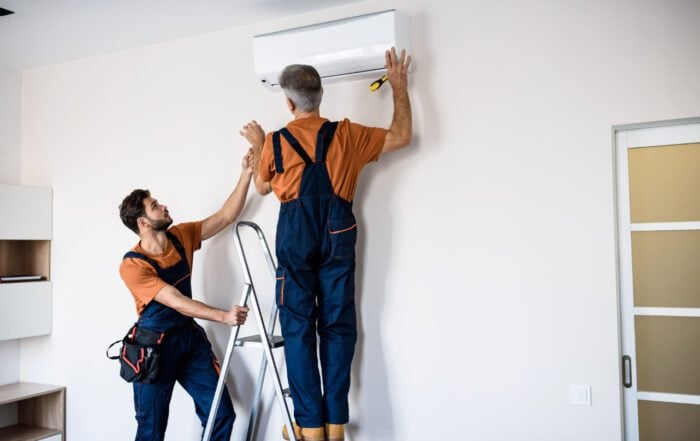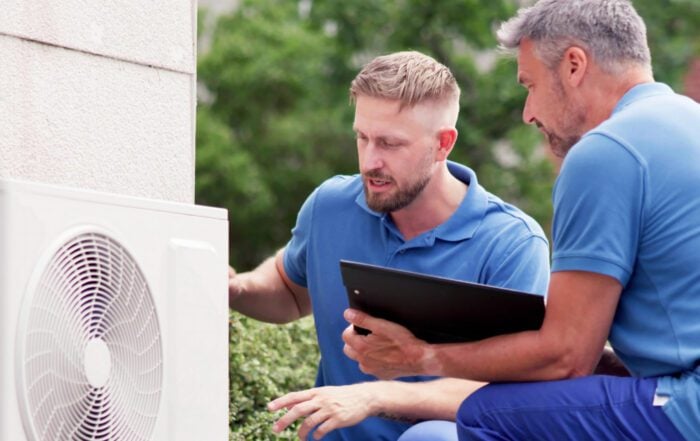Unmonitored household humidity is one of the most overlooked hazards for modern-day homeowners. Humidity is something everyone has to deal with, but the amount of care that should go into monitoring and regulating is frequently brushed aside.
With the whirlwind of weather that accompanies spring comes shifting humidity outdoors and inside your home. To maintain a healthy living environment, the methods you use to control your household humidity require extra attention. Let’s uncover the harmful side effects of excessively dry or humid air and the steps you can take to get your home’s humidity levels under control.
What is The Ideal Home Humidity?
The ideal humidity falls between 30-60%. This occurs when the air in your house has about 30-60% of the maximum moisture it can hold. Since the amount of water vapor in your home can substantially impact your health, sleep cycle, and furniture, it is vital to stay within this ideal range.
Impacts of Low Humidity
Low humidity not only wreaks havoc on your skin and is uncomfortable to breathe, but it also significantly dries out your mucus membranes. This puts your body at higher risk of catching the flu or a cold. Additionally, the airborne particles of SARS-CoV-2, the virus responsible for COVID-19, are more easily spread in dry air. Water in the air binds to the COVID aerosol droplets quickly at higher humidity levels, making them fall to the ground sooner and thus inhaled by humans less.
Excessive dry air can also damage your home, causing wallpaper to peel and wood floor panels to separate at the seams. While low humidity can cause a host of problems, high humidity also has its downsides.
Impacts of High Humidity
While high humidity is notorious for making your skin feel sticky, it also poses unique threats to your health and home. Excessive water in the air can encourage mold growth. Inhaling mold is harmful for our respiratory systems and can cause symptoms, including a runny nose, red eyes, and sneezing. High humidity can also make asthma symptoms worse, make it more difficult to sleep, and weather your walls and furniture over the years.
How Can you Manage Your Home Humidity Levels?
When Your House Is Too Humid
Ensure Proper Insulation
You may think insulation has the most impact on your house’s temperature and the money you can save, but it also determines the rate at which humid air leaks into your house. If you live in a high humidity climate, having your insulation inspected and replaced is key to keeping your home at a constant humidity level and preventing any cool air from leaving your home. It is especially important to make sure that areas vulnerable to moisture are monitored, including the attic.
Ventilate
If you find your house is too humid, ensure that ventilation fans are turned on in the kitchen, bathrooms, and laundry room when they are in use. These fans effectively expel moisture during showers, cooking, and laundry and prevent the buildup of excessive water vapor in the air.
Relocate House Plants
House plants do wonders for purifying our air and bringing light to a space, but they release a decent amount of moisture, contributing to the high humidity levels in a room. If your house has a lot of indoor plants, consider moving some of them outside, spacing them out throughout the house, or placing them in a well-ventilated room.
When Your House Isn’t Humid Enough
Cook Without Lids
Stovetop cooking releases a sizable amount of moisture into the air. When possible, forgo the lids and allow the steam to enter the air, naturally increasing the humidity in your home.
Add More Plants
Plants act as natural air purifiers and humidifiers as their roots absorb moisture and cycle it through the stems and up to the leaves. Some plants have additional benefits. For example, NASA research found that the Areca Palm is an efficient air purifier and one of the top performers in increasing household humidity.
Leave The Tub Full
If you enjoy frequent baths and are looking for an easy tip to increase your home humidity, try leaving the hot water in your tub to cool in the tub before you drain it. Giving the water more time to be absorbed by the air can help increase the humidity in your bathroom and connected rooms.
Upgrade To A High-Quality Whole-Home Humidifier System
Small humidifiers are suitable for adjusting the humidity levels of individual rooms, but they are not sufficient for monitoring the climate of an entire household. Whole-home humidifier systems are unique as they give you a centralized location to control your home humidity and stay comfortable throughout the year.
Perks of Whole-Home Humidifier Systems
Quiet and Stealthy
Whole-home Humidifier systems are quiet and invisible since they are integrated into HVAC systems. There’s no traditional bulky and loud humidifier to take up space and prevent you from getting a peaceful night of sleep.
Smooth Operation
Whole-home humidifier systems provide a level of ease and convenience unparalleled by alternatives. A whole-home humidifier can efficiently respond to changing moisture levels and deliver an appropriate amount of moisture to each room. All of this can be done at the press of a button.
Save Money
On top of keeping you healthy year-round, whole-home humidifiers add significant contributions to your pockets. When humidity levels are above average in the springtime, you will likely be inclined to boost up the AC in response. But your momentary comfort will be overshadowed by high electricity bills in the spring and summer when the humidity remains high. The most convenient option to maintain a comfortable humidity level while saving money long-term is to invest in a whole-home humidifier. This solution will help you keep your home warmer at a lower temperature.
Interested in Learning If a Whole-home Humidifier is Right For You?
To ensure you’re getting the best air humidity levels for your home, contact Stack Heating & Cooling. For more than 40 years, we’ve been providing expert HVAC maintenance services and advice to northeast Ohio residents. We’re happy to discuss and help you install a whole-home humidifier if you decide it meets you and your family’s needs. For more information about HVACs and whole-home humidifiers, give us a call (440) 577-4417 or visit our website.
Have Any Questions?
If this is an emergency please call 440-937-9134.
Otherwise, please feel free to call us or submit this form to schedule an appointment for service or request an estimate. We will contact you shortly!



